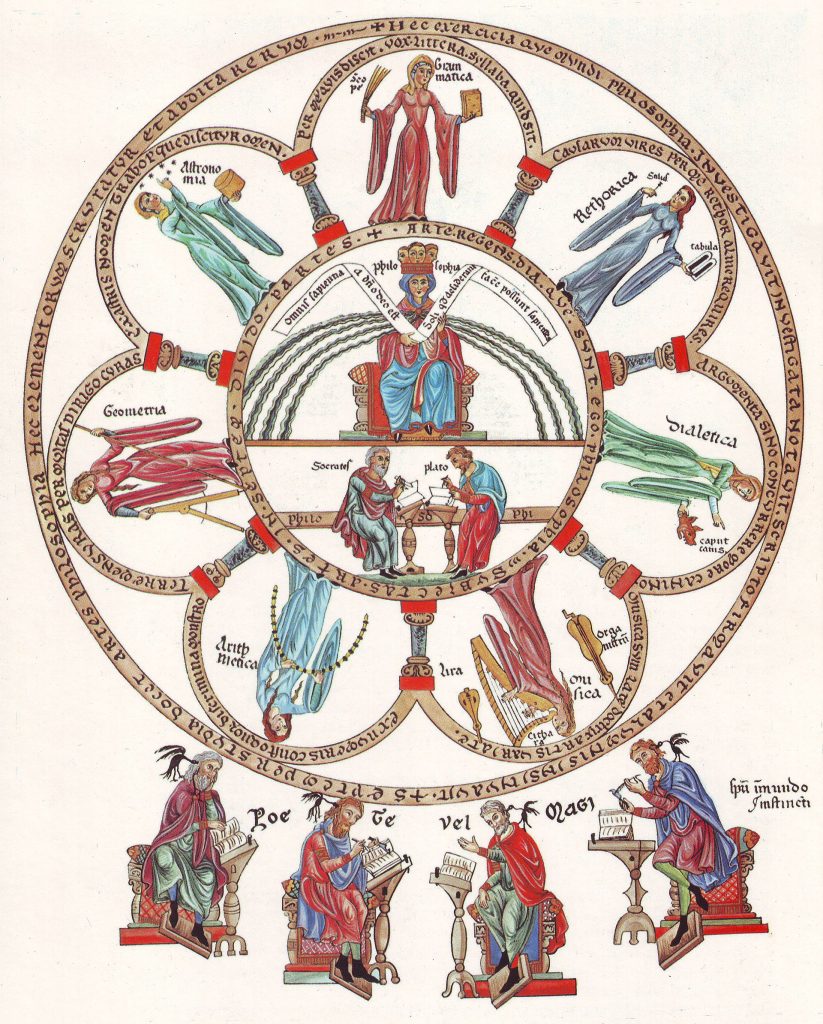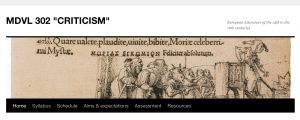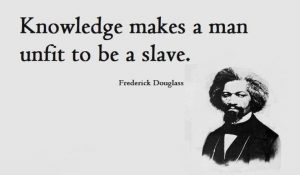
Philosophy and the seven liberal arts – from the “Hortus deliciarum” of Herrad of Landsberg (12th century)
MDVL 301: European Literature from the 5th to the 14th Century
“
The Liberal Arts”
(3 credits, 2016-17, winter session, term one: September to December 2016)
INSTRUCTOR: Dr Juliet Ó BRIEN
Office: 728 Buchanan Tower
Email: juliet.obrien@ubc.ca
Office Hours: Monday, Tuesday, Wednesday, and Thursday 14:30 – 16:30
Class time & place:
Tuesday & Thursday 13:00-14:20
Frederic Lasserre room 105
I. DESCRIPTION:
“The function of freedom is to free someone else.” (Toni Morrison)
What is a liberal arts education? A course in the Faculty of Arts? What does it mean to be a student at a university? What’s the point of reading? Or of lifelong learning? What are the personal, public, social, and cultural purposes of all these things?
In this interdisciplinary course we will explore some answers to these questions—as current now as they have been over the last several centuries—offered by some Medieval texts written in European vernaculars and in Latin, and having an influence throughout Medieval Europe. While our principal focus will be the study of literary works, we will also explore the historical landscape in which these landmarks are situated; the cultural background against which their actions are staged; and their relationship to an integrated creative and intellectual environment—including visual and plastic arts, music, ideas, and the sciences.
WEEKS 1-3
The course starts with a 5th-century text: Martianus Capella, De nuptiis Philologiae et Mercurii. It will introduce us to: the history of the idea of liberal arts and some of its architects, from the pre-medieval (e.gg. Plato, Aristotle, Cicero, Seneca) to the medieval (e.gg. Alcuin, Charlemagne, Alain de Lille) European worlds; university, scholarly, student, and intellectual cultures; these ideas’ relationship to and integration within a larger global context; and the cultural roles of reading, commentary, and satire.
WEEKS 4-10
The main body of the course centres on a 13th-century work which resonates through the 14th century and beyond, Guillaume de Lorris & Jean de Meun’s Roman de la Rose, through which “portal-text” we will investigate each of the seven liberal arts of the trivium (logic, grammar, rhetoric) and quadrivium (arithmetic, geometry, music, astronomy) individually in turn, one per week; along with a radial network of associated material (e.gg. illuminated manuscripts, libraries, Christine de Pizan and the Romance of the Rose debate, clerkly culture, public debates and other performances as proto-outreach, and other educations that include those excluded from or otherwise unable to attend universities).
WEEKS 11-13
The last three weeks will conclude in medievalist epilogue: looking forward to the 16th-c. studia humanitas, the post-medieval liberal arts & humanistic education, post-humanism and ecocriticism, emancipation and social justice, utopias, rethinking the university, speculative futures … and final round-table discussions.
Classes consist of interactive lectures interspersed with discussions. Assessment is based on
- throughout the course, class participation and regular short writing on the course blog
- a midterm short commentary paper
- a round-table short presentation followed by a student-led discussion or debate
- a final research project
- a final anti-exam celebratory festival (more or less carnivalesque) of research on that research-project: poster presentation session
- active participation in the final round-table discussions
The course is taught in English. Work may be written in English or another language according to preference or program requirements. There is no pre-requisite for this course.
While information above is subject to change between now and the beginning of term, Ó Brien’s previous (2011-12 term 2) MDVL302 may provide an idea of what this MDVL301 will be like:
II. COURSE OBJECTIVES:
This course aims to provide you with:
- foundational knowledge about the world of 5th- to 14th-century Europe: its culture and literature, the broad lines of its historical background
- a grasp of how those fit into broader schemes and spheres of reference: European culture before c. 1700, the “pre-modern” world, world literature, literature in English, comparative literature, translation (in the broadest sense), and contemporary global—including local—cultures, including but by no means limited to literature
- several sorts of reading skill: from fast general-gist reading; to very slow, careful, attentive, meticulous close-reading, that includes rereading
- fundamental research skills: library, catalogues, databases, reference works, online sources and resources; the collection and sorting of data, prior to its analysis and use
- writing skills: from short pithy paragraphs to longer forms; constructing sound arguments; using textual evidence and good reasoning; with an emphasis on commentary, analysis, exegesis, and critique: the “close writing” that parallels close reading
- last but not least, the development, enhancement, and honing of thinking, presentation, and discussion skills: analogy and allegory, paralleling exegesis and analysis
III. REQUIRED TEXTS:
TO BE PURCHASED
- Guillaume de Lorris & Jean de Meun, The Romance of the Rose. Trans. Frances Horgan. Oxford World’s Classics, 2009. ISBN: 978-0199540679
TO BE WATCHED
- The Name of the Rose. Dir. Jean-Jacques Annaud, based on the novel by Umberto Eco (1986).
AVAILABLE ONLINE VIA UBC LIBRARY OR COURSE SITE
Various other literary extracts, images of objects, and documents online at/via this present site.
The course will also feature a range of supplementary readings, radiating out from our main texts: high and low, scholarly and popular, serious and light-hearted—even scathingly satirical and subversive— some of which will be material for student presentations and other work: treatises, encyclopaedias, the prosimetrum, Latin lyric and debate, Occitan tensos & partimens, didactic works, romance, hagiography, spiritual poetry, Medievalisations of Classical texts, debates and quarrels, allegory, dream-vision, commentaries, and taxonomies & categorisations of knowledge; music, maps, monasteries, cathedrals, other buildings, movies and other post-medieval refashionings, etc.




